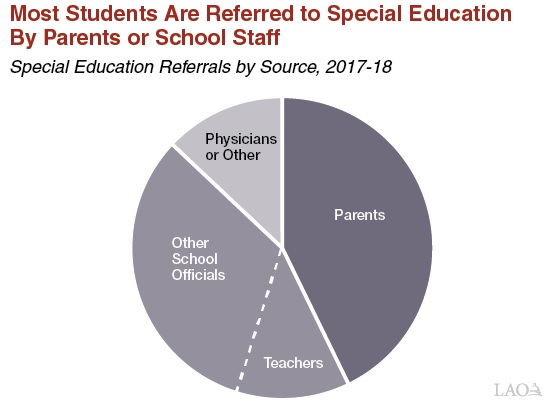
Various Disorders Which May Get Misdiagnosed as Autism You Should Know
In general, most parents and teachers are not being able to recognize that children are going through certain disorders. However, the scenario has changed as the awareness about various disorders in society has made parents, teachers, and other school staff aware of different disorders that students may face.
According to lao.ca.gov, we can see that most parents and school staff recognize students with special needs as special needs students.

Furthermore, there are various disorders that students can be going through, and providing them the necessary support requires accuracy from teachers and parents is crucial. If the disorder is being misunderstood it can lead to misdiagnosed. One of the disorders that is often misdiagnosed and misunderstood is autism which can lead to inappropriate treatments and interventions.
In this blog post, we will be exploring various disorders that are often misdiagnosed as autism in special needs students which will help special needs teachers to understand the difference better and provide accurate support.
1. Attention-Deficit Hyperactivity Disorder (ADHD)
Attention-Deficit Hyperactivity Disorder (ADHD) is one of the common disorders that is often found in most students. Its symptoms are often misunderstood by teachers, parents, or in various cases occupational therapists. The symptoms of ADHD are- hard to focus on any task, facing challenges in communicating effectively, and various repetitive behaviour which can overlap with the symptoms of autism.
However, there’s a significant difference between autism and ADHD, autistic students tend to become more focused and become obsessed with certain activities of their interest, whereas students with ADHD always struggle to remain focused on a particular task for long. So, it’s very essential for special needs teachers and parents to be aware of the difference between these two disorders and consider the possibility of ADHD within students.
2. Anxiety Disorders
Anxiety disorder is also one of the disorders that have various symptoms similar to autism symptoms. It’s one of the disorders which is prevalent in students who have autism. Those students who have autism often face difficulties socializing and always need a proper routine to follow which is similar to symptoms of anxiety disorders.
However, special needs teachers and parents must understand the difference between these two disorders and it could co-exist in special needs students.
3. Borderline Personality Disorder (BPD)
Borderline Personality disorder (BPD) is a disorder that consists of symptoms like- impulsive behaviour, instability in mood, and difficulties forming and maintaining any interpersonal relationship. Students with BPD may often show traits of being impulsive and irregular emotional behaviour which can overlap with autistic characteristics.
However, special needs teachers and parents need to understand these behavioural traits within students with special needs to ensure that they provide accurate support to students.
4. Obsessive-Compulsive Disorder (OCD)
Obsessive-Compulsive disorder (OCD) is a disorder that is often found in most individuals who don’t even have autism disorder. Those students who have OCD disorders can exhibit repetitive behaviour and actions or who like to do certain actions in a certain manner. However, those students who have autism also exhibit repetitive actions and behaviour because of anxiety which may be similar to OCD symptoms.
It is important for special needs teachers and parents to understand the difference between these two disorders and to provide accurate support to special needs students.
5. Post-Traumatic Stress Disorder (PTSD)
PTSD which is known as Post-traumatic Stress disorder is a very common disorder that can be found in many students, especially children with autism who have gone through bullying, or traumatic experiences in life. The symptoms of PTSD may overlap in the life of students with autism.
Special needs teachers and parents must be aware of children who may go through any traumatic experience and understand its impact on their behavioural and emotional well-being. By having a proper understanding, teachers can provide appropriate support and interventions to children with autism who may be going through PTSD disorder at the same time.
6. Psychotic Disorders
Psychotic disorders and autism share certain symptoms, which are similar like- facing difficulties in communicating effectively and being involved, socially. In the past, the brief is that those children who have autism are considered to be schizophrenic.
However, it is important to understand that both disorders are different. Those students have autism while going through any personality test can interpret questions more literally which may lead to misdiagnosis of psychosis. So, special needs teachers and parents must have a clear understanding of the difference between the two disorders to provide accurate support and interventions.
Proper Understanding of Disorder Similar to Autism is Necessary
Those children who have symptoms of autism disorder may have other disorders at the same time whose symptoms are similar to autism. This could create confusion for special needs teachers, parents, or even occupational therapists for misdiagnosis as autism. However, those teachers who have pursued courses like autism awareness courses for teachers know the difference of autism disorder symptoms and other disorder symptoms that may be similar to autism symptoms.
Furthermore, in this blog post as well, we have shared various disorders which is similar to autism disorder and which can overlap sometimes with the symptoms of autism disorder, which may help you to provide accurate guidance, support, and interventions to special needs students.
Lastly, remember that even if you have completed Bachelor of Education in Special Educational Needs and are capable of understanding the difference between autism and various disorders it is suggested that it is better to collaborate with healthcare professionals like psychologists and psychiatrists to provide accurate support to students with special needs.
We believe education should be accessible for everyone. That’s why we don’t charge for our blogs. Find the right course that will help you in your career with us, contact us at - 66-21055721. You can mail us at act@asiancollegeofteachers.com

